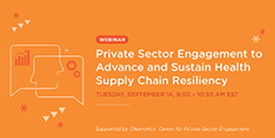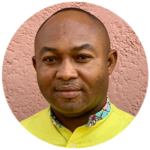Through the USAID Global Health Supply Chain (GHSC) - Technical Assistance (TA) Francophone Task Order, health leaders are improving national supply chains and advancing global health security.

Private Sector Engagement to Advance and Sustain Health Supply Chain Resiliency .
Event | September 14, 2021

On Tuesday, September 14, 2021, we hosted a panel webinar on the importance of engaging the private sector in building resilient health supply chains to enhance health outcomes in LMICs.
In recent years, the international donor community has doubled down on the idea of the private sector as an important partner to achieve sustainable health outcomes in low- and middle-income countries. Now more than ever, the development community recognizes the critical role the private sector can play in expanding access to critical care, procuring and distributing health commodities and medical equipment, and working with existing health systems to ensure essential service delivery.
Our panel of experts explored key trends, challenges, and opportunities in private sector engagement in global health supply chains, and how to leverage it for scaled development impact in health.
Moderator
Ralph Titus, Health Systems Strengthening Team Lead, USAID Global Health Supply Chain Program-Procurement and Supply Management, Chemonics International

Ralph Titus is a commercial supply chain professional with an MSM in supply chain and a CPPM in project management. He is experienced in strategic development and process improvements in manual and automated commercial, humanitarian response, and developmental logistics in North and Latin America, Europe, Asia, the Mid East, and Sub-Sahara Africa. He is a practitioner of “intelligent warehouse design”, leveraging the power of ERP/WMS systems to enhance and reduce order cycle times. He has an established record building, training and empowering local teams to conduct activity-based costing, develop key performance indicators, and implement 5S methodology. He is a veteran of numerous successful logistics STTAs in support of the Global Health Supply Chain Procurement and Supply Management project.
Panelists
Dr. Krishna Jafa, CEO, Precision Global Health

Dr. Krishna Jafa is a physician and epidemiologist with 25 years of experience in the financing, fundraising, design, management, delivery, monitoring, and evaluation of health programs and research across the donor, private, nongovernmental, and public sectors. She applies strategic systems change thinking to leverage both supply- and demand-side public, private, and nonprofit delivery channels to improve coverage, quality, and equity of healthcare. Her experience includes building sustainable, efficient, equitable, and gender-intentional health delivery and social business models to scale up life-saving interventions; applying rigorous and smart metrics; and leveraging existing data to measure progress and outcomes. Dr. Jafa is a committed advocate for women’s and girls’ health and reproductive rights with a medical degree from Rajasthan University in India and a master’s in public health from Harvard University and is an alum of the US CDC’s Epidemic Intelligence Service.
Lizandra Cassia Caposso Cristóvão da Costa, Deputy General Director, Central Procurement and Supply of Medicines and Medical Equipment of Angola (CECOMA)

Lizandra Cassia Caposso Cristóvão da Costa is a specialist in Health Systems Strengthening ample experience in public health services management and a strong understanding of the healthcare industry. She currently holds the position of Deputy General Director of the Angolan public institute responsible for the procurement and distribution of medication and medical equipment. A natural born leader, she has proven her ability to manage and work with diverse teams by fostering a culture of collaboration and constant innovation. She has experience in the public sector, including holding senior positions within the Angola Ministry of Health and a powerful force in the workplace. Mrs. Da Costa holds two post-graduate degrees, one in health systems strengthening from the University of Melbourne in Australia and one in pedagogical aggregation from the University Agostinho Neto in Angola, as well as a bachelor’s degree in health systems administration from DeVry University in Illinois.
Nikki Tyler, Market Access Lead Advisor, Center for Innovation and Impact, USAID Bureau for Global Health

Nikki Tyler leads the market access activities at the Center for Innovation and Impact (CII) in the USAID Bureau for Global Health. In this role, she applies business-minded approaches to the development, introduction, and scale-up of health interventions to accelerate impact against the world’s most important health challenges. Prior to joining USAID, Nikki worked as a consultant at Dalberg Global Development Advisors, a program officer at Results for Development, and a financial and economic consultant. Nikki holds an master’s degree in business administration from the Kellogg School of Management at Northwestern University and a bachelor of arts in economics from Boston College.
Dr. Teddy Manday, Technical Director, USAID Global Health Supply Chain Program-Technical Assistance Francophone Task Order DRC, Chemonics International

Dr. Teddy Manday is a medical doctor and epidemiologist with more than 13 years of experience in public health program management of US-funded programs in the Democratic Republic of the Congo (DRC) and the Central African Republic. He is currently a technical director for the Global Health Supply Chain Program-Technical Assistance Francophone Task Order project in the DRC. Before joining Chemonics, he worked as, as a project coordinator for Management Sciences for Health (MSH), as a country director at the University Research Company (URC), and as doctor in the DRC public health system. He holds a master’s degree in epidemiology from the Royal Tropical Institute in Amsterdam.
Tony Wood, Managing Director, MYDAWA

Tony Wood is an engineer by profession with 11 years of experience working in East Africa. He joined MYDAWA in 2016, prior to their launch, and has grown this revolutionary e-health & supply chain solution to be the leading e-pharmacy in Kenya. Under his leadership and supported by a strong pharmacy team, MYDAWA has played a significant role during the COVID-19 pandemic and provided valuable services to the more vulnerable in the community who may have been practicing “self-isolation”, “social distancing” or may just be concerned about visiting crowded pharmacies. Tony specializes in business leadership and management, transformational growth, client relationship and outsourcing solution development, and has ample experience working in the United Kingdom, Europe, and Africa transforming commercial and operational organizations. He holds a master’s degree in telecommunications business from the University College of London.

